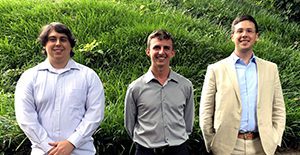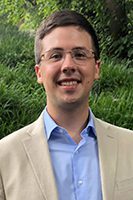Thomas D. Walsh Graduate Research Fellowship Finalists for 2020 Announced

The Thomas D. Walsh Graduate Research Fellowship, made possible by the generous support of Dr. Thomas D. Walsh recognizes outstanding contributions by M.S. candidates to graduate research. Returning graduate students are eligible for this prestigious award after their first year. The Thomas D. Walsh Graduate Research Fellowship supports the winner with a research assistantship and tuition support through their second year.
The finalists are in. Congratulations to Jared Meadows, Alexander Clinkscales, and Matthew Faussett for their selection as finalists for the Graduate Research Fellowship competition this year! The competition will be conducted on July 31st and the recipient will be announced soon thereafter. Congratulations again!
Jared Meadows
 Jared Meadows, originally from Adairsville Georgia, is a first generation college graduate from Berry College in Rome, Georgia. Jared graduated with a B.S. in Biochemistry in 2018, and joined the UNCC MS Chemistry program in fall 2019. At UNCC Jared joined the laboratory of Dr. Michael Walter and joined a collaborative project with the laboratory of Dr. Jerry Troutman focused on the development of new probes for bacterial polysaccharide synthesis. His future goal is to obtain a Ph.D. in Chemistry or related field and to eventually become a college professor.
Jared Meadows, originally from Adairsville Georgia, is a first generation college graduate from Berry College in Rome, Georgia. Jared graduated with a B.S. in Biochemistry in 2018, and joined the UNCC MS Chemistry program in fall 2019. At UNCC Jared joined the laboratory of Dr. Michael Walter and joined a collaborative project with the laboratory of Dr. Jerry Troutman focused on the development of new probes for bacterial polysaccharide synthesis. His future goal is to obtain a Ph.D. in Chemistry or related field and to eventually become a college professor.
Jared’s research project focuses on the development of new asymmetric thiazolo[5,4-d]thiazole (TTz) derviatives with the intent of using them as biomarkers to detect biochemical activity within bacteria. Specifically, the biochemical pathways that lead to the synthesis of complex bacterial surface polysaccharides used by these organisms to protect from the environment and host detection. Using TTz derivative, these pathways can be studied in greater detail, would could potentially lead to the development of a new class of antibiotics.
Alexander O. Clinkscales
Alexa nder Clinkscales, a native of Colorado, graduated with a BS in chemistry in 2019 from Elon University in Elon, NC. At Elon, Alexander conducted research for Dr. Dan Wright on the kinetics of oxidation with the free radical 2,2-diphenyl-1-pricrylhydrazyl (DPPH) and received the ACS Division of Inorganic Chemistry Undergraduate Award in 2019. Alex joined the UNCC MS program in fall 2019 and began to conduct his MS research in N-heterocyclic thione and selone ligands in the laboratory of Dr. Daniel Rabinovich.
nder Clinkscales, a native of Colorado, graduated with a BS in chemistry in 2019 from Elon University in Elon, NC. At Elon, Alexander conducted research for Dr. Dan Wright on the kinetics of oxidation with the free radical 2,2-diphenyl-1-pricrylhydrazyl (DPPH) and received the ACS Division of Inorganic Chemistry Undergraduate Award in 2019. Alex joined the UNCC MS program in fall 2019 and began to conduct his MS research in N-heterocyclic thione and selone ligands in the laboratory of Dr. Daniel Rabinovich.
Alexander works on a project that involves the synthesis and coordination chemistry of new N-heterocyclic thione (NHT) and selone (NHS) ligands containing bulky aromatic substituents on the nitrogen atoms. More specifically, a new family of ligands that incorporate an aromatic ring in the backbone and present enhanced solubility in organic solvents, is being developed. Reactivity studies include the preparation of several closed-shell (d10) metal complexes with such ligands, including compounds of mercury(II) and silver(I). Significantly, based on related complexes previously studied in the Rabinovich laboratory, the silver derivatives are likely to exhibit anticancer activity.
Matthew Faussett
 Matthew Faussett, originally from Durham, North Carolina, received his B.S. in Chemistry from the University of North Carolina at Charlotte with a minor in Mathematics in fall 2019. While at UNCC, Matt was a four-year member of the Ice Hockey Club team and aided the team in its first ever ACC championship in 2018. He was acknowledged for his determination and willingness to sacrifice for the team during a ceremony for graduating seniors in spring 2019. Matt first began research in 2018 with the Etzkorn group working on diflouroindanone chemistry. After graduating in late 2019, Matt began pursuing the M.S. in Chemistry at UNCC in the Etzkorn lab with a focus on oxacage chemistry and the development of an elusive target from a long-standing project within the group. The target compound, a tetra-oxacage, was an oxygen functionalized cage compound with C-O-C alternating units. Matt has aided in the development of several novel compounds. He plans to pursue a career in cage chemistry either through a PhD in organic chemistry or an industry position focused on research & development.
Matthew Faussett, originally from Durham, North Carolina, received his B.S. in Chemistry from the University of North Carolina at Charlotte with a minor in Mathematics in fall 2019. While at UNCC, Matt was a four-year member of the Ice Hockey Club team and aided the team in its first ever ACC championship in 2018. He was acknowledged for his determination and willingness to sacrifice for the team during a ceremony for graduating seniors in spring 2019. Matt first began research in 2018 with the Etzkorn group working on diflouroindanone chemistry. After graduating in late 2019, Matt began pursuing the M.S. in Chemistry at UNCC in the Etzkorn lab with a focus on oxacage chemistry and the development of an elusive target from a long-standing project within the group. The target compound, a tetra-oxacage, was an oxygen functionalized cage compound with C-O-C alternating units. Matt has aided in the development of several novel compounds. He plans to pursue a career in cage chemistry either through a PhD in organic chemistry or an industry position focused on research & development.
Oxacages, a class of organic compounds similar to the well understood crown ethers, have recently been under investigation for their role in metal complexation and molecular recognition. The Etzkorn group is developing a multifaceted, synthetically variable approach to a novel tetraoxa-cage and related compounds from a readily available hydrocarbon precursor. However, direct access to this oxacage from its starting material is presumably blocked due to the presence of reactive intermediates. To circumvent this, we aim to use the hydrocarbon precursor to develop a series of novel, oxygen-functionalized, stable intermediates that ultimately furnish the oxacage. This compound and its synthetic intermediates are of interest for probing structure-reactivity relationships. The hydrocarbon scaffold allows for exploration of innovative directions in organometallic chemistry, as well as furnishing potentially biologically active metal complexes. Targeted replacement of select methylene positions of the hydrocarbon precursor may give new avenues for investigation of unique molecular architectures and insight into fundamentals behind reactivity and bonding not yet explored.